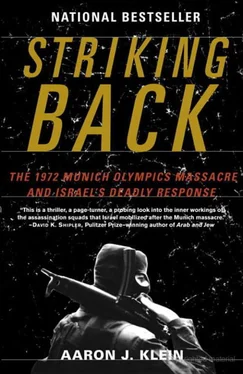• • •
The Mossad was caught off guard by the scope of Black September’s ambition. Up until May 1972 all the group’s operations were aimed at Jordanian targets. The Mossad frequently reported to Prime Minister Meir’s cabinet that Black September was interested only in harming the kingdom next door. That argument collapsed on May 8, 1972, when Black September took credit for hijacking Sabena Flight 571. Not only was there no warning of the attack, but the Mossad and Military Intelligence utterly failed to recognize what was clearly a strategic shift: a newfound focus on Israeli targets. Even after Sabena, Israeli intelligence agencies continued to insist that Israel was not the main target; the Sabena highjacking was just a ricochet, the price of proximity to Jordan.
Why did Abu-Iyad choose the Munich Games as the target for a major terror attack? In his book, Stateless, Abu-Iyad later wrote that the operation sought to achieve three goals. One was “to present the existence of the Palestinian People to the whole world, whether they like it or not.” Another was “to secure the release of 200 Palestinian fighters locked in Israeli jails.”
And the third, in a neat encapsulation of the rationale of all terrorists, was this: “to use the unprecedented number of media outlets in one city to display the Palestinian struggle—for better or worse!”
MUNICH, OLYMPIC VILLAGE
TUESDAY, SEPTEMBER 5, 1972, 0015H
The bus was filled with the sounds of backslapping and laughter. The jubilant Israeli athletes were on their way back to the Olympic Village after an evening at the theater. The delegation had just seen Fiddler on the Roof, in German, with Shmuel Rodensky, the noted Israeli stage actor, in the lead role. He invited the team backstage during the intermission to meet the cast. They took a group picture: their last.
Shmuel Lalkin, head of the delegation, sat at the front of the bus, his wife, Yardena, by his side. Arik, his thirteen-year-old son, was hanging out in the back row with the wrestlers and weight lifters. Yossef Romano, David Berger, Mark Slavin, and Eliezer Halfin were crazy about the kid.
As the bus approached the Olympic Village, Arik sidled up to his father and asked to sleep in the wrestlers’ room. Lalkin refused. His family was not part of the delegation, which meant they slept outside of the village, at their own expense. Arik cried and begged. “Dad, c’mon, I’m a big kid already. They’re my friends. Just one night.” Lalkin did not cave in. He needed to set a personal example for everyone else on the squad. Romano and Halfin came to help Arik out. “We’ll look out for him, Shmuel, don’t worry, it’s only one night. Look how badly he wants to come and, anyway, it’ll just keep us loose.” Lalkin wouldn’t budge. Even a stern look from Yardena didn’t change his mind. Principles were immovable, always. Romano, Israel’s champion weight lifter in the middleweight class for the last ten years, kept the pressure on for a few more seconds and then returned with Halfin to his seat. At 0030 hours the athletes filed off the bus at the Olympic Village. Yardena and Arik continued on to their apartment, ten minutes away. The pleasant Munich weather brought a few of the Israeli athletes to the dining room for a late night snack. Eventually everybody said good night and went to their quarters.
The delegation had been assigned five apartments. Apartment 1 was for the coaches and judges; Apartment 2, the marksmen, the fencers, and the track and field athletes; Apartment 3, the weight lifters and wrestlers; Apartment 4, the doctor; Apartment 5, Shmuel Lalkin. The women stayed in separate dorms far from the men’s quarters. Israel’s two sailors were housed in northern Germany, in Kiel, where their competition was being held.
It was almost one in the morning when Lalkin finally went to his room. He set his alarm for 6 A.M. He wanted to support Mark Slavin, the rookie wrestler, by attending his pre-match weigh-in.
While the members of the Israeli delegation were enjoying Fiddler on the Roof, eight Palestinian terrorists, traveling solo and in pairs, arrived at the Munich central railway station, just a ten-minute walk from the theater, and ordered dinner. They were excited. Nobody could sit still. Whispers were exchanged. This was their first face-to-face meeting. Seated around a rectangular table, they learned the particulars of the mission. One of the commanders leaned in from the head of the table and, speaking in a hushed tone, explained that they were going to kidnap the Israeli athletes in the Olympic Village, take them hostage, and release them in exchange for over two hundred Palestinian prisoners held behind bars in Israel. The hostages and the kidnappers would fly to an Arab state, where the exchange would be made. The operation, called Ikrit and Biram, was named in memory of two Christian villages near the Israeli border with Lebanon. The villagers were forcibly evacuated by the Israelis in 1951 “until the security situation allows their return.” Abu-Iyad chose the code name as a symbol of the Palestinian desire to return to a homeland that had been torn away from under their feet.
Jamal Al-Jishey, a dark-skinned nineteen-year-old, was brimming with motivation. Years later, as one of the three Palestinians to live through Munich, he would say (as captured in the documentary film One Day in September ), “I felt great pride and happiness that I would be participating in an operation against the Israelis. I was finally going to fulfill my dream.” Just a few months before, as the heat of the summer started to rise, Al-Jishey was summoned to an elite training camp established by Fatah leaders on the Mediterranean shore, a few miles south of Beirut. The Al-Jisheys lived in Shatila, the teeming Palestinian refugee camp in Beirut. Fifty men, the youngest of them only seventeen, arrived with Al-Jishey for basic training. All the recruits learned how to fire an AK-47 assault rifle and properly release F-1 hand grenades. At the end of the training session, six out of the fifty were selected. They lived in Palestinian refugee camps in Lebanon, and were ready to give their lives if necessary.
The group’s members were: Adnan Al-Jishey, twenty-six, uncle of Jamal Al-Jishey, married, and a gifted student who held a chemistry scholarship to the American University of Beirut; Mohammed Safady, nineteen, garrulous and confident; Khalid Jawad, a strong soccer player who had lived in West Germany for two years; Ahmed Sheik Thaa, who grew up in Germany; and Afif Ahmed Hamid, a veteran member of the Fatah organization who had recently returned to Beirut after studying for a little more than a year at a German university.
The six were told that they had been selected for a top secret mission. The details of the operation remained a mystery. They were instructed to leave their families without telling them anything about what they were doing. In mid-July, the month before the Olympics, the group of six flew to Libya for advanced military training. In the isolation of the desert camp the six young men became one cohesive group. “We got to know each other during training in Libya; we were all alike, children of the Palestinian refugee camps with a shared cause and a shared aim,” Jamal Al-Jishey said. Al-Jishey and his partners endured endless hours of intensive training drills at a tent camp deep in the heart of the Libyan desert. In the dead heat of July, an exhaustive exercise routine beat them into shape. Their daily regimen included endless sprints and leaps, especially over walls and fences. Al-Jishey was sure he was going to be sent into a Zionist army base. He never imagined that the drills were preparing him for quick entry into the Olympic Village in Munich, Germany.
Читать дальше












